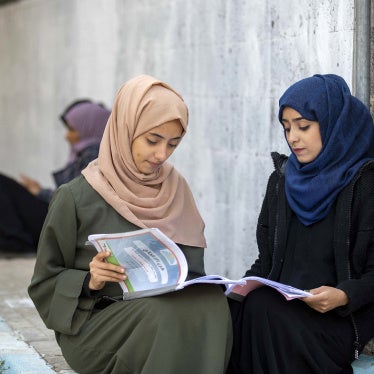(Beirut) – Saudi authorities announced further changes to regulations that now allow women over 21 to travel abroad freely and obtain passports without permission from their male guardian. However, the new regulations do not positively affirm the right to travel abroad, leaving open the possibility that male guardians could seek a court order to restrict female relatives’ travel.
On August 20, 2019, the Saudi Press Agency reported that the Departments of Passport and Civil Status have begun enforcing the amended Travel Documents Law and regulations, and media reports suggest that women have been allowed to travel abroad without permission.
However, the online and mobile platform Absher, which Saudi citizens use to request or renew passports, has not been updated to reflect these changes. Further, women activists who have peacefully sought these changes remain in prison or on trial for their women’s rights activism.
“Saudi women have won a long-awaited victory to travel abroad and apply for passports without a male guardian’s permission,” said Rothna Begum, senior women’s rights researcher at Human Rights Watch. “However, the authorities should ensure that male guardians are not able to use court orders to sidestep this advance, and the authorities should update the online platform Absher so that women can apply for passports as easily as men can.”
The Council of Ministers’ decision on July 31, published in the official gazette on August 1, amended the Travel Documents Law, the Civil Status Law, and the Labor Law. The amendments to the Travel Documents Law changed the references to obtaining a passport to gender-neutral, effectively removing discriminatory restrictions on women.
On August 18, the interior minister issued amendments to the implementing regulations of the Travel Documents Law that previously required male guardian permission for women and girls and for men and boys under age 21 to obtain a passport. Now, only those under 21, both male and female, will require guardian permission for a passport, removing the requirement that women over 21 need such permission.
The amendments deleted article 28, which stated that Saudi women’s travel abroad must be in accordance with “applicable instructions.” This article formed the legal basis for requiring a male guardian’s permission for a woman to travel abroad, including those over 21. Another amended article uses gender-neutral language to require male guardian permission for travel abroad by those under age 21. There are exceptions for those under age 21 who are married, have a government scholarship to study abroad, or are employees participating in official missions abroad.
However, in practice, women under 21 may be more likely to face situations in which their guardians may not approve their travel than men under 21.
In addition, mothers who have primary custody of their children can now also apply for passports and provide travel permission for their children.
Under international human rights law, including the Arab Charter on Human Rights ratified by Saudi Arabia, everyone has the right to leave any country, including their own. Any restrictions can only be individual, for a legitimate reason, and proportionate – as, for instance, during a criminal investigation.
On August 20, al-Yaum, a Saudi media outlet, reported that a thousand women traveled abroad without permission on August 19 through border crossings in the Eastern Province, which includes crossings to Kuwait, Bahrain, the United Arab Emirates, Qatar (currently closed), and Oman.
Human Rights Watch has previously documented how the online and mobile app Absher has been used to control women’s movement. Human Rights Watch spoke to individuals who confirmed that as of August 21, the app had not been updated to allow women to apply for passports online and that it still allowed male guardians to approve or reject female relatives’ travel. However, the Passports Department has stated via Twitter that women over 21 can apply for or renew passports in person at their offices and that they will update the Absher platform.
The Council of Ministers’ July decision made several advances in other areas relating to women’s rights. While the changes are important, Saudi women still must obtain a male guardian’s approval to get married or be released from prison. In addition, as there is no anti-discrimination law – the government has no duty to actively uproot discrimination in practice, such as women’s shelters requiring a male guardian’s approval for a woman to leave, or hospitals requiring male guardian approval for surgery relating to reproductive health care, including lifesaving abortions. While labor law reforms mean that employers can no longer discriminate against women in employment, authorities have not announced any steps to enforce that requirement.
Despite reforms to the civil status law, women continue to face discrimination in relation to marriage, family, divorce, and decisions relating to children (e.g. child custody). Men can still file cases against daughters, wives, or female relatives under their guardianship for “disobedience,” which can lead to forcible return to their male guardians’ home or imprisonment.
“These combined changes are among the most sweeping reforms of women’s rights that Saudi Arabia has made and the first significant break with the country’s male guardianship system, which has allowed men to control Saudi women’s lives from birth to death,” Begum said. “Now the Saudi authorities should uproot all remaining discrimination against women in both law and practice.”
In addition, at least five women’s rights activists, including Loujain al-Hathloul, Samar Badawi, and Nassima al-Sadah, remain in detention while many other women who have been released face judicial decisions that could send them back to prison. Al-Hathloul has been in detention for more than a year, and she and other women activists have said they have been tortured and sexually harassed in detention. Many of their “offenses” relate to peaceful human rights work, including promoting women’s rights and calling for an end to the male guardianship system.
“The charade should no longer go on that the Saudi authorities can grant reforms on the one hand and on the other imprison the women who fought for them,” Begum said. “Saudi authorities need to release these women immediately and have all charges against them dropped.”









